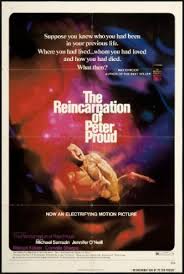
THE REINCARNATION OF PETER PROUD
US, 1974, 104 minutes, Colour.
Michael Sarrazin, Jennifer O'Neill, Margot Kidder, Cornelia Sharpe, Paul Hecht.
Directed by J. Lee Thompson.
Audiences should not expect the pros and cons of genuine reincarnation here, but rather a good thriller with reincarnation as its device for involving audiences in Peter Proud's quest for his previous identity. There is a chilling eeriness about the coming together of the jigsaw pieces and, especially, the ending. While the plot is somewhat predictable, it is well-enough paced to keep the audience interested and give a plausible enough basis for the film's reincarnation pre-supposition. Michael Sarrazin is Peter Proud, fearing for his sanity, tormented by his dreams, obsessed with his search. Margot Kidder is skilful in a complex role in both his lives.
1. What were the expectations from the title? The impact of the film as a thriller, about reincarnation? How enjoyable was the thriller content of the film?
2. Why was the film made? Did the film have any value as regards realism about reincarnation? How plausible was the presentation of reincarnation? Did the film make it credible? The background discussions about reincarnation? Does the film's success depend upon belief in reincarnation?
3. What were the best ingredients of the film as a thriller? The inevitability of Peter Proud's search? The initial opening and forebodings? The clues coming together? Marcia Curtis in both stories? The inevitable climax? How strong was the atmosphere of the film? The impact of the opening dreams and reality? The recurring dreams as a chorus? The detail of the house, the fight, the lake, the murder? The atmosphere of Peter's search? The details of the Massachusetts town? The inevitability that the previous story was real?
4. How much of the film's success depended on structure? The dreams and their fulfilment? The counterbalance of reality? The moving towards discovery of greater reality for Peter Proud? The finale and the repetition of fate?
5. How well visualised were the dreams, the background of the nature of the dreams? The physical and psychological research? The tests? The plausibility of Peter Proud's dreams? The nature of the symbolism? The creations of the unconscious imaginations? Did the dreams indicate reasons for reincarnation? The type of personality repeated from life to life?
6. How successful a hero for the film was Peter Proud; the background of his university work, the details of his life, his relationship with Nora, the fear of hallucinations, his feeling that he would break down?
7. Was the nature of his obsession credible? His relationship with Sam? The need for the search, the nature of the search and its impact? The greater discovery of meaning?
8. The importance of discovering Anne? (The psychological overtones of father and daughter and lover). The searching out of Marcia? The clash and the psychological conflict with her? The need to rid himself of her menace? The inevitability and pathos of his death? The final images?
9. What did the film have to say about fate, the inevitability of love and death? The meaning of life?
10. How evil a person was Jeff Curtis? The audience's visual impression? The newspaper background and people's gossip, the tennis club etc.? The possibility of vengeance by reincarnation? The same victimisation?
11. How well communicated was the personality of Marcia? Her social background, marriage with Jeff Curtis, her fears and horror of him, the fight, the rape, death? The remorse of her old age? Her drinking? Attachment to Anne? Her fears when it appeared that Peter Proud was something more? The inevitability of her killing her husband again? The importance of the flashbacks and the dreams for her characterisation?
12. The importance of Anne in the film? The father-daughter relationship, mother-daughter relationship?
13. The importance of the New England background? The contents of the dream, the details of the past and updated, the Puritan and heritage of backgrounds? The need for the exorcism in the place itself?
14. Characters of Nora and her supporting Peter yet withdrawing? Sam and his interests yet his wanting to exploit Peter?
15. Did the film have much more value than mere entertainment?